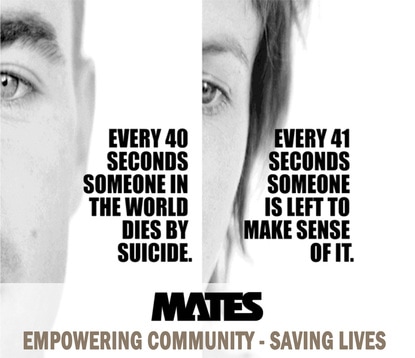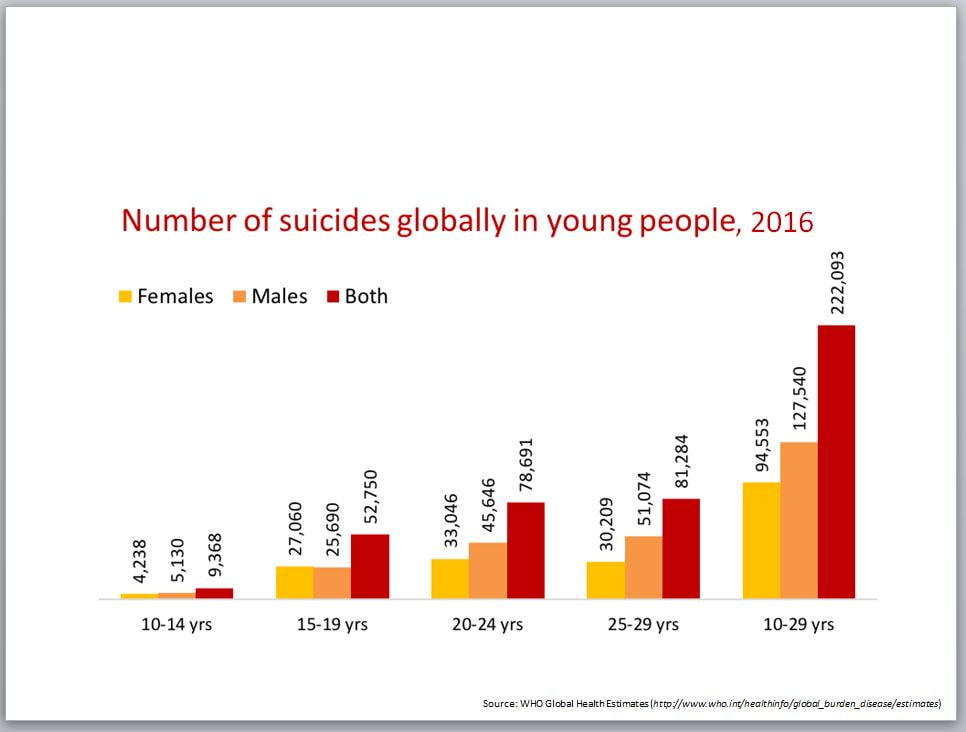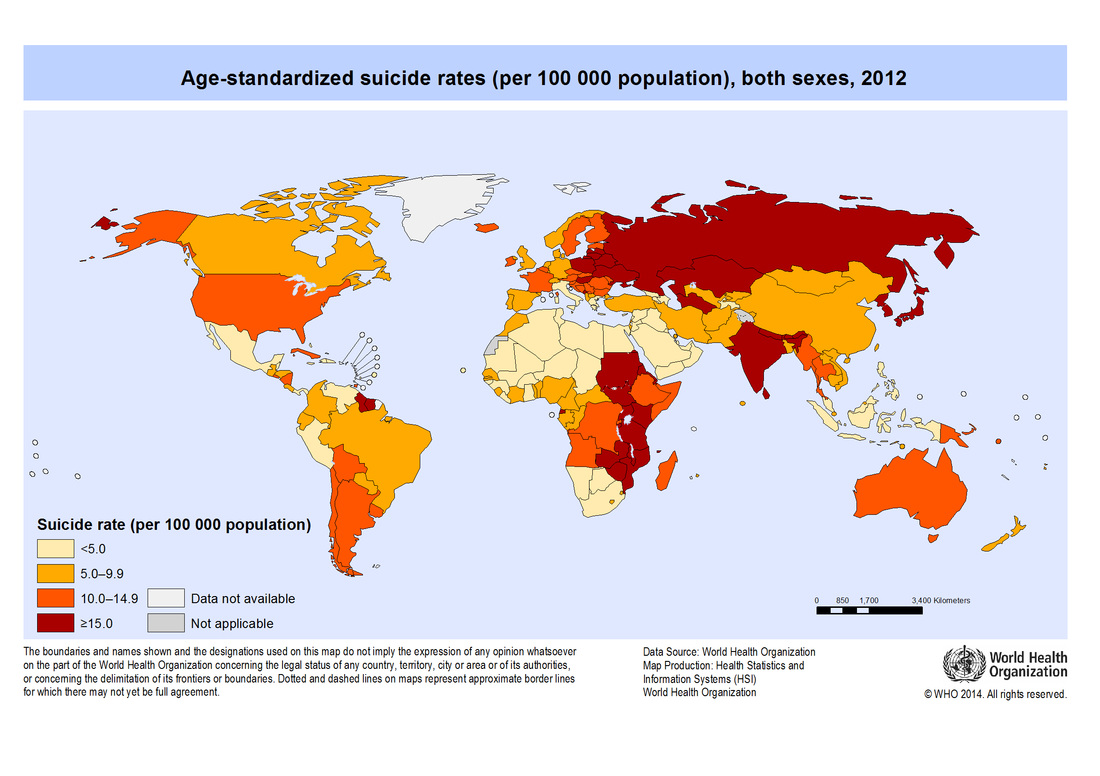M8TZ - SUPERHUMAN REVOLUTION
Help MATES Decrease Suicide Statistics Around the World
In this thought provoking post, MATES provide an interesting view on world suicide rates and statistics. This includes how many people around the world attempt suicide each year, as well as an indication of how many are having serious suicidal thoughts; and the common life challenges that can lead to people seriously contemplating suicide.
Worldwide there are 800,000 suicides each year, with approximately 24,000,000 attempted suicides and 455,890 people every day having serious suicidal thoughts and needing a MATE to turn to.
Worldwide there are 800,000 suicides each year, with approximately 24,000,000 attempted suicides and 455,890 people every day having serious suicidal thoughts and needing a MATE to turn to.
Suicides vs Attempted Suicides vs Serious Suicidal Thoughts
It is estimated that for every person who completes suicide, 30 more attempt suicide with another 206 people having serious thoughts about suicide.* Let's put these numbers into context so we know how many people are struggling with life's challenges and who need a MATE to turn to in a time of need.
Regardless of the number of people per capita, these are real lives at stake!
Regardless of the number of people per capita, these are real lives at stake!
In 2017:
Australia had 3,128 suicides meaning there were approximately 650,624 attempted suicides and 1,782 people every day having serious suicidal thoughts.
Canada had 4,157 suicides meaning there were approximately 124,710 attempted suicides and 2,369 people every day having serious suicidal thoughts.
China had 128,586 suicides meaning there were approximately 3,857,580 attempted suicides and 73,276 people every day having serious suicidal thoughts.
India had 210,869 suicides meaning there were approximately 6,326,070 attempted suicides and 120,166 people every day having serious suicidal thoughts.
The United Kingdom had 5,821 suicides meaning there were approximately 174,630 attempted suicides and 3,317 people every day having serious suicidal thoughts.
The United States had 47,173 suicides meaning there were approximately 1,415,190 attempted suicides and 26,882 people every day having serious suicidal thoughts.
In 2018-2019:
New Zealand had 685 suicides meaning there were approximately 20,550 attempted suicides and 390 people every day having serious suicidal thoughts.
*REF: https://www.samhsa.gov/data/sites/default/files/NSDUH-DR-FFR3-2015/NSDUH-DR-FFR3-2015.pdf
Australia had 3,128 suicides meaning there were approximately 650,624 attempted suicides and 1,782 people every day having serious suicidal thoughts.
Canada had 4,157 suicides meaning there were approximately 124,710 attempted suicides and 2,369 people every day having serious suicidal thoughts.
China had 128,586 suicides meaning there were approximately 3,857,580 attempted suicides and 73,276 people every day having serious suicidal thoughts.
India had 210,869 suicides meaning there were approximately 6,326,070 attempted suicides and 120,166 people every day having serious suicidal thoughts.
The United Kingdom had 5,821 suicides meaning there were approximately 174,630 attempted suicides and 3,317 people every day having serious suicidal thoughts.
The United States had 47,173 suicides meaning there were approximately 1,415,190 attempted suicides and 26,882 people every day having serious suicidal thoughts.
In 2018-2019:
New Zealand had 685 suicides meaning there were approximately 20,550 attempted suicides and 390 people every day having serious suicidal thoughts.
*REF: https://www.samhsa.gov/data/sites/default/files/NSDUH-DR-FFR3-2015/NSDUH-DR-FFR3-2015.pdf
Youth Suicide Related to Relationship Breakdown and Fatherless Homes
From our experience in helping to prevent suicide in the global community for over 15 years, it has become quite evident to us that the most prominent factor in suicidal ideology is relationship breakdown in some form. The negative outcomes from conflicts within ourselves and with others sets up an environment which encourages disconnection and isolation.
In the US (these statistics may be similar for other countries too), children from fatherless homes account for:
- 63% of youth suicides (Source: US Dept of Health and Human Services, Bureau of Census)
- 71% of pregnant teenagers (Source: US Dept of Health and Human Services)
- 90% of all homeless and runaway children
- 70% of juveniles in state-operated institutions (Source: US Dept of Justice, Special Report, Sept. 1988)
- 85% of all children that exhibit behavioural disorders (Source: Centre for Disease Control)
- 80% of rapists motivated with displaced anger (Source: Criminal Justice and Behaviour, Vol 14, p 403-26, 1978)
- 71% of all high school dropouts (Source: National Principals Association Report on the State of High Schools)
- 75% of all adolescent patients in chemical abuse centres (Source: Rainbows for All God’s Children)
- 85% of all youth sitting in prisons (Source: Fulton Co. Georgia, Jail Populations, Texas Dept. of Corrections 1992)
Suicide prevention is everyone's responsibility
Unresolved Life Challenges Can Lead to Suicide
As human beings we have an inherent need to feel connected. We also have the need to feel heard, the need to feel understood and the need to feel as though we belong. When we perceive ourselves as not having these needs met, an emotional response is triggered. How we deal with that emotional response determines the equilibrium of our mental and emotional state throughout the day:
Addictions
Every person has the inherent need to feel better. Therefore, every action which a person takes is in the hope that they will feel better in what they achieve from doing that action. When an emotional response is triggered and is unresolved, a person often looks to an external fix to make them feel better. This may include smoking, alcohol, drugs, food, sexual connection, gambling, amongst other addictions.
The addiction is the incorrect belief that it is that “thing” that makes the person feel better. The thought of not having access to that thing (fix), triggers further emotional responses which unresolved, reinforce the need for the fix. It’s not the method of the addiction, but the underlying hurt and sense of disconnect that needs to be addressed, because this is what makes the person reach for a better feeling.
The Emotional Reset Technique provided in MATES Cafe Community training, neutralises the emotional response and brings the brain into an empowered state. In the moment the triggered emotional response is resolved, the need for the external fix disappears because there is no need for a dopamine hit.
The addiction is the incorrect belief that it is that “thing” that makes the person feel better. The thought of not having access to that thing (fix), triggers further emotional responses which unresolved, reinforce the need for the fix. It’s not the method of the addiction, but the underlying hurt and sense of disconnect that needs to be addressed, because this is what makes the person reach for a better feeling.
The Emotional Reset Technique provided in MATES Cafe Community training, neutralises the emotional response and brings the brain into an empowered state. In the moment the triggered emotional response is resolved, the need for the external fix disappears because there is no need for a dopamine hit.
Bullying
When a person feels out of control within themselves, it is a natural progression to then start controlling others to gain some semblance of control in their lives. This can result in bullying behaviour. An effective way to break the cycle of bullying is to teach children and adults how to resolve an emotional response whenever it’s triggered, then how to upgrade their actions and thinking to be aligned with how they truly want to feel.
Domestic and Family Violence
Suppressing the initial emotional response (fight/flight or freeze/shutdown) causes an individual to default into a reactionary mode. This can include verbal and/or physical reactions. Fuel is added to the fire when the other person is also triggered into an unresolved emotional state. This compounds the sense of frustration as both individuals battle to feel heard and understood. Neither person can clearly communicate in this state and little to no self-control can be exerted until they learn how to control their emotional triggers.
Depression
Overriding human needs include the sense of connection and self expression. An unresolved emotional response can lead to us feeling disconnected and out of sync with ourselves. From an operational perspective, this makes us feel misaligned with others. It is the nature of the mind to analyse all present and remembered data. This frequently leads to judgmental thoughts about ourselves and others which triggers further emotional responses.
The mind then becomes engaged in an endless loop which analyses negative thoughts and the related emotions. The depressed state is exacerbated when the individual has problems which they don’t know how to solve. These may include financial, relationship, family, work and sexual function issues.
The mind then becomes engaged in an endless loop which analyses negative thoughts and the related emotions. The depressed state is exacerbated when the individual has problems which they don’t know how to solve. These may include financial, relationship, family, work and sexual function issues.
Sexual Dysfunction
This is mostly due to the lack of a complete sex education which includes the mental mechanics of sex required to fully function as an adult. Without knowing what to focus on, or what to switch focus to, there is much anxiety and confusion involved in the sexual act. This commonly results in sexual failure. Statistically, up to 80% of people are affected by sexual dysfunction.
Sexual Harassment
In some individuals, an unresolved emotional response leads to the need for sexual connection. Without knowing how to self-regulate sexual arousal, however, this emotional need can become a sexual obsession. This can result in inappropriate sexual behaviour, sexual misconduct, sexual assault or rape. The severity of the harassment will depend on the individual’s current mental and emotional state.
Suicide
The negative outcomes from conflicts within ourselves and with others sets up an environment which encourages disconnection and isolation. Frequently tied in to the depression cycle, suicide is often a spur-of-the-moment action in an attempt to end the problem.
Suicide ideology is often generated by an unresolved emotional response which leads to disconnection, isolation, and desperation. Every life lost represents someone’s partner, child, parent, friend or colleague.
For each suicide approximately 135 people suffer intense grief or are otherwise affected. This amounts to another 108 million people per year who are profoundly impacted by suicidal behavior.
Suicide ideology is often generated by an unresolved emotional response which leads to disconnection, isolation, and desperation. Every life lost represents someone’s partner, child, parent, friend or colleague.
For each suicide approximately 135 people suffer intense grief or are otherwise affected. This amounts to another 108 million people per year who are profoundly impacted by suicidal behavior.
Wherever they are in the world, the point of suicide is the loneliest place on Earth for the person contemplating taking their own life. Together we can help decrease worldwide suicide populations by providing global access to breakthrough online programs and initiatives containing the necessary tools to overcome mental, physical and emotional challenges in peoples' lives.
Giving people a proven technique to overcome the reactions to their emotional triggers as well as providing emotional support and encouragement, can help save lives.
Mind Renaissance which includes the power of the Emotional Reset Technique helps to align your mind and emotions to empower your relationships and your life.
Giving people a proven technique to overcome the reactions to their emotional triggers as well as providing emotional support and encouragement, can help save lives.
Mind Renaissance which includes the power of the Emotional Reset Technique helps to align your mind and emotions to empower your relationships and your life.
MATES Cafe is Erasing Lonely Worldwide
MATES help people of all ages, cultures and ethnicity overcome life challenges such as loneliness, relationship breakdown, anxiety, loss and grief by being there and helping them find new life direction. Need a MATE | Be a MATE
International Suicide Prevention Plans
| australia_fifth_national_mental_health_and_suicide_prevention_plan__and_accompanying_implementation_plan_.pdf | |
| File Size: | 438 kb |
| File Type: | |
| canada_advocacy_for_national_suicide_prevention_strategy.pdf | |
| File Size: | 508 kb |
| File Type: | |
| new_zealand-moh-suicide-prevention-strategy-2019-2029-and-plan-2019-2024-v2.pdf | |
| File Size: | 532 kb |
| File Type: | |
| uk__parliament_suicide_prevention_policy_and_strategy.pdf | |
| File Size: | 1392 kb |
| File Type: | |
Other World Suicide Statistics
| Samaritans_Suicide_Statistics_Report_2016.pdf | |
| File Size: | 2652 kb |
| File Type: | |
| co_4_4_teenage-suicide.pdf | |
| File Size: | 579 kb |
| File Type: | |
| world_suicide-värnik_2012.pdf | |
| File Size: | 533 kb |
| File Type: | |
| AGlobalPerspectiveInYheEpidemiologyOfSuicide.pdf | |
| File Size: | 190 kb |
| File Type: | |
| PreventingSuicideAGlobalImperativeWHO2014.pdf | |
| File Size: | 5364 kb |
| File Type: | |
M8TZ - Superhuman Revolution: Worldwide | New Zealand | Australia | United States | United Kingdom | Canada | China | India
Contact MATES | Sitemap | Policies | | - © M8TZ 2024 All rights reserved.
Contact MATES | Sitemap | Policies | | - © M8TZ 2024 All rights reserved.










